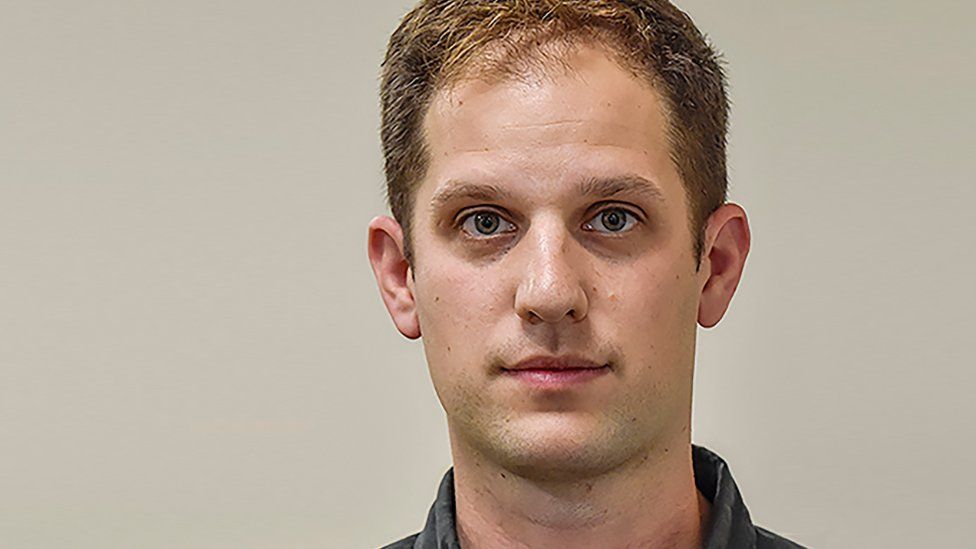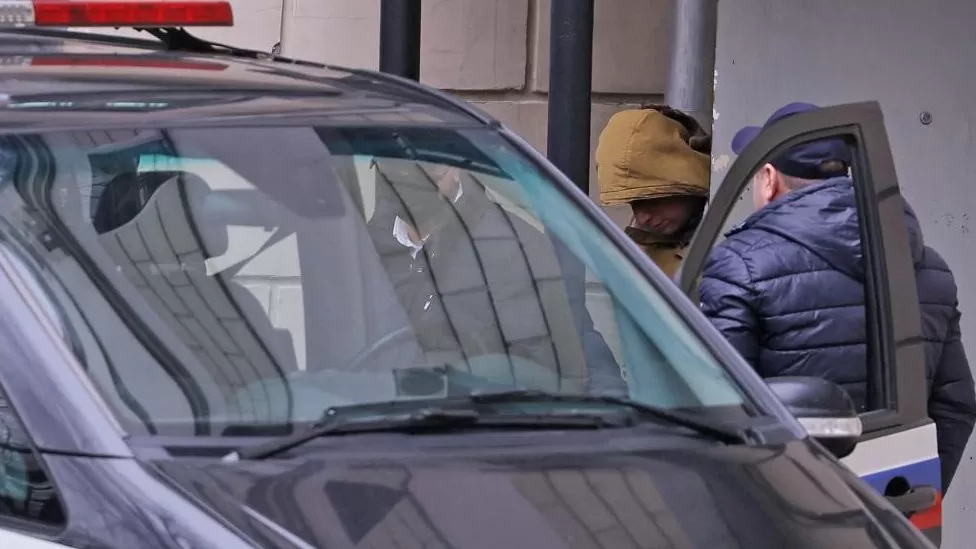Evan Gershkovich, an experienced Russia correspondent, was working in Yekaterinburg at the time of his incarceration.
The Wall Street Journal emphatically disputed the accusations against him while expressing its “great worry” for his safety.
The reporter was allegedly “caught red-handed,” according to the Kremlin.
The reporter had been “operating on US directions” and “gathering state secrets,” according to the FSB, which claimed to have “halted criminal actions.”
A few hours later, the security agency brought him to Moscow’s Lefortovo District Court for his official detention.
Afterwards, he was spotted being driven away after being seen being removed from the building.
His imprisonment was mandated by the court until May 29.
His lawyer said he had not been allowed into the courtroom and Tass news agency reported the journalist had denied the charge. The court had earlier been cleared of staff and visitors because of a bomb threat, Russia’s Ria state news agency said.
The FSB confirmed in its statement that Evan Gershkovich had foreign ministry accreditation while working in Yekaterinburg 1,800km (1,100 miles) east of Moscow.
His last WSJ piece this week reported on Russia’s declining economy and how the Kremlin was having to deal with “ballooning military expenditures” while maintaining social spending.
But the FSB claimed he had been detained “acting on US instructions” and that he had “collected information constituting a state secret about the activities of a Russian defence enterprise”. A criminal espionage case was launched by the FSB’s investigation department, it added.
In a statement, the Wall Street Journal said it stood in solidarity with the reporter and his family: “The Wall Street Journal vehemently denies the allegations from the FSB and seeks the immediate release of our trusted and dedicated reporter, Evan Gershkovich.”

The Kremlin also commented on the detention of the American journalist. “This is the responsibility of the FSB, they have already issued a statement,” said spokesman Dmitry Peskov. “The only thing I can add is, as far as we know, he was caught red-handed.”
Espionage in Russia carries a maximum jail term of 20 years.
Even before the full-scale invasion of Ukraine in February 2022, reporting from Russia had become increasingly difficult.
Independent journalists were labelled “foreign agents” and BBC Russia correspondent Sarah Rainsford was expelled from the country.
When the war began, Russia introduced a criminal offence for reporting “fake news” or “discrediting the army”, under which dozens of Russians have been convicted for criticising the invasion on social media.
Almost all independent media were silenced, shut down or blocked, including major outlets TV Rain, Echo of Moscow radio and newspaper Novaya Gazeta. Many Western media chose to leave Russia.
Evan Gershkovich has covered Russia for the Wall Street Journal for more than a year, having worked there previously for the AFP news agency and the Moscow Times.
Russian political expert Tatyana Stanovaya said his detention had come as a shock. In the FSB’s view of espionage, “collecting information” could simply mean gathering comments from experts, she said, while acting on US instructions could simply refer to his editors at the Wall Street Journal.
Russian foreign ministry spokeswoman Maria Zakharova said what a Wall Street Journal employee was doing in Yekaterinburg had “nothing to do with journalism”. It was not the first time the status of “foreign correspondent” had been used to “cover up activities that are not journalism”, she said.
Tensions between the Kremlin and the West have become increasingly tense in the 13 months of Russia’s war in Ukraine. Press freedom watchdog Reporters Without Borders said it was “alarmed by what looks like retaliation”.
Russian Deputy Foreign Minister Sergei Ryabkov told local news agencies that it was too early to discuss prisoner swaps: “I would not even put the question in this plane now, because you understand that some exchanges that happened in the past took place for people who were already serving sentences.”
Several US citizens are being held in Russia. Days before the invasion, American basketball star Brittney Griner was detained at a Moscow airport and jailed for carrying cannabis oil. It was 10 months before she was freed in exchange for notorious Russian arms dealer Viktor Bout.

